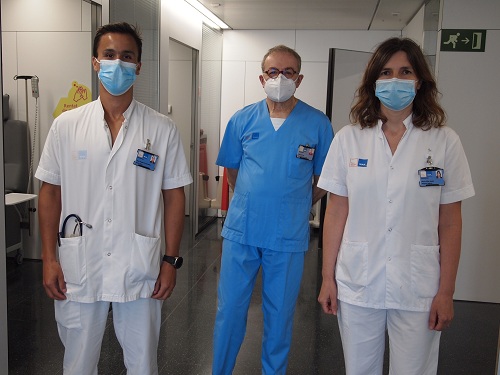
15/10/2020 - Press release
Asthma is increasingly prevalent and affects 5-10% of the general population
They believe that the treatment currently used in many cases, based solely on short-acting bronchodilators like the well-known Ventolin, may increase the risk of severe asthma attacks. This is revealed by a study published in the journal Archivos de Bronconeumología. They advocate the use of inhaled corticoids, which is also the treatment recommended by the international Global Initiative for Asthma (GINA). Asthma is increasingly prevalent and affects 5-10% of the general population. Unfortunately, the decline in associated mortality has slowed in recent years. In the current context, characterised by the COVID-19 epidemic, there is no evidence that suffering asthma implies a more severe form of COVID-19.
Using just short-acting bronchodilators, like Ventolin (salbutamol), as the only treatment, whether continuously or when required, can increase the risk of severe asthma attacks, according to pneumologists in Hospital del Mar's Pneumology Service. This is the evidence from a study led by doctors in this team together with the centre's pharmacy service and researchers from the Hospital del Mar Medical Research Institute (IMIM), published in the journal Archivos de Bronconeumología. The authors of the work point out that the most successful alternative is treatment involving the association of inhaled corticosteroids and formoterol, both of which are already available for treating asthma.

From left to right, Dr. José Gregorio González, Dr. Joaquim Gea and Dr. Pilar Ausin
For patients with mild asthma, "Therapy that associates inhaled corticosteroids and formoterol on an on-demand basis can be beneficial, especially if we keep in mind the problem of poor compliance with inhaled treatment in this type of patient, as this alternative would help maintain a high degree of effectiveness against severe exacerbations", explains Dr. Pilar Ausín, a pneumologist at Hospital del Mar and first author of the study. Mild asthma is the most common, but a significant percentage of patients control it inadequately, only using Ventolin on demand. This temporarily relieves the symptoms, but at the same time perpetuates or increases bronchial inflammation, elevating the risk of a serious attack, which can lead to hospital admission and even death. "Treatment that involves this drug only, as required, should be re-evaluated, even in the early stages of treatment", asserts the head of the Pneumology Service, Dr Joaquim Gea. Moreover, its replacement with inhaled corticoids is already recommended by the international asthma guide from the Global Initiative for Asthma (GINA). In fact, in its latest revision in May, the Spanish Guideline on the Management of Asthma (GEMA, Guía Española para el Manejo del Asma), has moved from advising treatment with salbutamol only for mild asthma sufferers to incorporating treatment with inhaled corticoids, although the short-acting bronchodilators are maintained for a maximum of two inhalations per month (previously this was two per week).
Young patients with no previous attacks
The study carried out by researchers at the Hospital del Mar analysed data from patients previously diagnosed with bronchial asthma who were admitted to the centre between June 2018 and June 2019. In total, 96 patients had to be admitted to the hospital because of a severe asthma attack. Their average age was 58, and the hospital stay lasted eight days. 10.4% suffered a life-threatening attack and were admitted to either the Intensive Care Unit or the Semi-Critical Care Unit. The patients in this group shared a number of characteristics. They were younger individuals, with an average age of just 28, who had been diagnosed with allergic asthma and were only receiving treatment with salbutamol.
Half of these patients needed intubation and mechanical ventilation, but, fortunately, all survived the attack. None of them had suffered an asthma attack before the episode that forced them to be admitted to hospital. "The study revealed a profile of a young, mildly asthmatic patient with an allergic phenotype and being treated with salbutamol on demand only, who came to the emergency department with a life-threatening asthma attack", underlines Dr. Ausin.
A disease on the rise
Asthma is an illness that has been increasing in prevalence since the 1960s. Several studies estimate that it affects 5-10% of the general population. The decline in both the mortality associated with this disease and hospitalisation rates has slowed down over the past decade, with an increased incidence being seen in Spain over the past four years. It is a frequently under-diagnosed pathology and, in mild cases, sufferers often fail to follow their treatment programme properly.
Reference article
José Gregorio González-García, Roberto Chalela, Nuria Carballo, Pilar Ausín. Asma leve y exacerbaciones de riesgo vital: ¿es hora de que demos un paso adelante? Archivos de Bronconeumología, 2020, ISSN 0300-2896, https://doi.org/10.1016/j.arbres.2019.11.028
© Institut Hospital del Mar
d'Investigacions MèdiquesLegal Notice and Privacy Policy | Cookie Policy | Site Index | Accessibility | Find Us | Contact